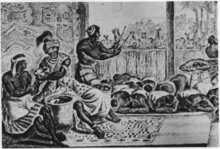

 The Portuguese explorer Diogo Cão reached the mouth of the Congo in 1484.
Commercial relationships quickly grew between the inland Bantu kingdoms
and European merchants who traded various commodities, manufactured goods,
and people captured from the hinterlands. After centuries as a major hub
for transatlantic trade, direct European colonization of the Congo river
delta began in the late 19th century, subsequently eroding the power of
the Bantu societies in the region.
The Portuguese explorer Diogo Cão reached the mouth of the Congo in 1484.
Commercial relationships quickly grew between the inland Bantu kingdoms
and European merchants who traded various commodities, manufactured goods,
and people captured from the hinterlands. After centuries as a major hub
for transatlantic trade, direct European colonization of the Congo river
delta began in the late 19th century, subsequently eroding the power of
the Bantu societies in the region.

